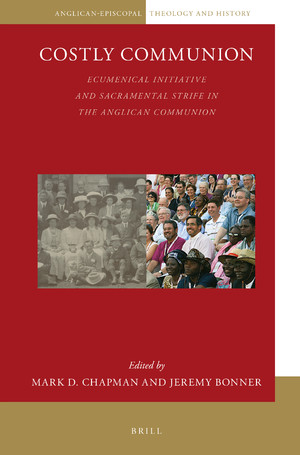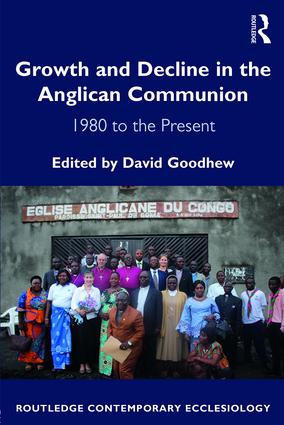For some while I have contemplated an articulation of my thoughts on the war for diocesan and parish property currently being waged in my home diocese and across the United States between the Episcopal Church (TEC) and the newly formed Anglican Church in North America (ACNA). Yesterday, Judge James’s decision burst on the scene, broadly supporting the position of the TEC diocese that they are entitled to the entirety of the diocesan endowment (parish property is not addressed under this ruling). While some on the conservative side are no doubt gearing up for an appeal (the fact that there appear to be conflicting bases for recent decisions against ACNA in Pittsburgh and Fort Worth even suggest that appeals could ultimately end up in the Supreme Court), I find myself wondering what such legal contortions have to do with the mission of ACNA itself.
I should perhaps preface my remarks with some explanation on my own experience of being an Anglican. In the course of thirty-eight years, I have been a member of four parishes: the middle-of-the-road Church of England parish of St. Cuthbert’s. Durham (1970-1992); the gaudily extrovert Anglo Catholic bastion of St. Paul’s, K Street in Washington DC (1992-2003); the equally high, but more down-to-earth foundation of Mount Calvary, Baltimore (2003-2004); and the utterly un-categorizable Trinity Cathedral in Pittsburgh (2004-2009). All have contributed to my understanding of what it means to be first a Christian and secondly an Anglican.
In the course of my seventeen years in the United States (more or less the same period of time that Archbishop Robert Duncan has served in Pittsburgh in a variety of guises), the configuration of Anglicanism – both in the United States and worldwide – has been transformed. Parallel jurisdictions, heavily influenced by a strongly countercultural brand of Evangelicalism, exist throughout the English-speaking world, filling a void created, at least in part, by the failure of successive Archbishops of Canterbury to articulate a vision of mutually dependent provinces that minimizes dramatic shifts in doctrinal belief and practice at a provincial level. In the United States, the pace of theological innovation – of which Bishop Gene Robinson is a symptom not the cause – has precipitated an alternative body for conservative Anglicans (ACNA) that currently occupies an uncertain position within the structures of global Anglicanism. All of this is amply documented, but would attract little attention in the secular world but for two factors: the prominent part that the debate over human sexuality has played in the conflict between liberal and conservative Christians and the struggle for ecclesiastical assets. It is the latter that concerns me here.
My experience of the property conflict is shaped by my five years in Pittsburgh, as much an observer of how the recent past has shaped the present as a player in the world of diocesan politics. I have no great stake in diocesan institutions one way or the other, although I have developed a number of spiritual associations and friendships for which I am devoutly grateful. There are others who stand to lose far more than I in terms of long-standing family connections to particular parishes or significant contributions to diocesan projects and endowment funds. That said, the following arguments have been advanced in favor of an aggressive legal strategy by the conservative side:
1. Preservation of parish property for the active worshipping community, which has sustained it with minimal input from the diocese and practically none from the national church.
The appeal to the rights of property holders is, of course, deeply buried in the American psyche. Practical congregationalism has very much been the norm in American religious life since colonial days, and while national church bodies emerged during the 19th century, they tended to be comparatively weak (a state of affairs heightened by the internecine strife that erupted in many Protestant denominations over the Fundamentalist Controversy in the 1910s). The Episcopal Church was no exception to this tendency, with a weak national structure that only began to solidify during the late 1950s (ironically about the same time that denominational numbers began their precipitate decline). The last thing that the Episcopal Church’s bishops desired was direct responsibility for the running of the parishes in their care. Bishops were responsible for missions (whose incumbents they could appoint or remove at will), but incorporated parishes stood very much on their rights. A bishop’s power was ultimately negative (a refusal to perform episcopal acts, such as Confirmation) and a refusal to license clergy from outside the diocese. Once a clergyman was canonically resident, however, an incorporated parish could call him even in the face of the bishop’s disapproval, as Pittsburgh Bishop Cortlandt Whitehead discovered to his cost in 1912.A form of congregationalism upon which was superimposed an episcopal polity was thus the working norm.
A fair reading of the historical record, therefore, would seem to imply the virtue of a pragmatic distribution of parish properties according to the majority sentiment of their congregations, when serious doctrinal divisions arise, with the goal, as far as possible, of continuing an effective worshipping community in the sacred space. Rarely are decisions of this sort as overwhelming as they were in Northern Virginia in 2006, however. What does one do, for example, in the case of a 60%-40% split, especially if the 40% provide a greater proportion of the parochial income? What obligations do the “winners” have to the “losers” in such a scenario, if, as seems more and more to be the case, there is little appetite for negotiating a compromise? Should those with long attachment to the parish be granted rights to marry and bury and to hold periodic services in the church?
It’s dangerously easy to dismiss the gripes of the minority as those of “sore losers” but if we accept that the Church is not, in its essence, a democracy, then we should avoid putting too much faith in the democratic process as infallibly revealing God’s will. That sort of language has been all too evident at recent sessions of General Convention and it is not a positive development. Those looking to “come out and be separate” then, if they wish to make a claim to property, need to start with an assessment of the needs of those who will reject such a course, which usually includes both those who share their views but reject their strategy and those who fundamentally disagree with their views. A building and even a diocesan endowment fund are fleeting assets, as compared with the income secured from consistent and dedicated pledgers. More to the point, the notion that “they’re trying to steal our property” is now as rife on the conservative side as on the liberal one, even though the “property,” if we have our priorities right, is God’s to dispose of as He sees fit. This does not mean that one should be entirely passive in such matters, but it should make the legal approach (and that, at least to me, includes defending against a suit as well as initiating it) one into which you enter at great personal risk.
2. Preventing the exploitation of buildings or other assets by those who would use them to propound a “false Gospel.
A rationale now much in vogue in conservative circles is to ensure that monies currently under their control do not fall into the hands of heretics. Successive legal battles deplete the national church’s financial reserves until a point is reached at which TEC will have no choice but to capitulate and reach an agreement with their opponents. Again, providing the legal points being contested are genuine, this would seem to be a legitimate legal strategy.
But is it what the Christian life calls us to pursue? Although there is a fair degree of liberal commentary that describes ACNA as an “un-Anglican” body, it still largely remains the preserve of conservatives to describe their opponents as “non-Christians.” Frankly, I find it hard to accept this as a blanket designation. There is plenty of non-Christian behavior evident, but unfortunately that’s not unheard of in orthodox circles (even here in Pittsburgh). Within TEC, there is a worldview whose concessions to the prevailing culture have compromised its ability to proclaim the Gospel – and have brought us to the pass of realignment – but that doesn’t necessarily translate into assured destruction for all in the TEC camp. It is at least arguable whether preventing corporate (not individual) monies from the affected dioceses to pass in any form to TEC and its subsidiaries is something to be ensured by any and all means. Some TEC programs funded – especially at the diocesan level – will be positive or, at any rate, innocuous, while some, of course, will not, but there is a distinct difference between redirecting funds (as was the case in the early years of the Anglican Communion Network) and calculated asset-stripping.
3. Bringing public attention to bear on constitutional abuses of the polity of the Episcopal Church, most notably the infamous Dennis Canon, and forcing ultimate acknowledgment of the essentially congregational nature of TEC in matters of property.
We now come to the crux of the matter, namely that actions taken by TEC in recent months run counter to the very Constitution and Canons they have in place, the deposition of Bishop Duncan being a case in point. The voluminous writings of such legal observers as the Anglican Curmudgeon provide extensive commentary on this point. It seems fairly clear that TEC is, in large measure, willing (in a paraphrase of the old moniker about the Supreme Court) to make the Constitution and Canons what the Presiding Bishop and the Executive Council say it is. That is undeniable; it is also not ACNA’s problem. It is a very real problem for conservatives within TEC and one with which they will have to wrestle in the years ahead, but for ACNA conservatives to huff and puff about the illegality of TEC practices seems misplaced. After all many have written – and continue to write – as if this was only to be expected, so surprise and outrage seem a little contrived.
More to the point, the whole basis of the new post-Constantinean model of “doing Church” has been predicated on ending any state interest in the affairs of ecclesiastical bodies. The present recourse to the courts is essentially an appeal to the state to resolve issues that the latter cannot begin fully to understand. We really need good divorce lawyers handling these cases, not experts in Canon Law. None of this is to say that I think TEC has a particularly good moral claim to property (after all, while most of the 19th century men and women who helped create the major endowments wouldn’t have got on very well with the present ACNA leadership, they would have had even less time for today's liberal revisionists) but it does call into question whether a courtroom confrontation is the best venue for fighting such a battle. Property is becoming an encumbrance as people are distracted by litigation from doing the work of mission that ACNA’s leaders proclaimed at Bedford.
I close with another little Tolkien paradigm that seems apposite, just after Frodo has offered Galadriel the Ring and she has refused it. “I wish,” Sam Gamgee tells her, “you’d take his Ring. You’d put things to rights. You’d stop them digging up the gaffer and turning him adrift. You’d make some folk pay for their dirty work.” “I would,” Galadriel responds. “That is how it would begin. But it would not stop with that, alas!”
Are we listening?









